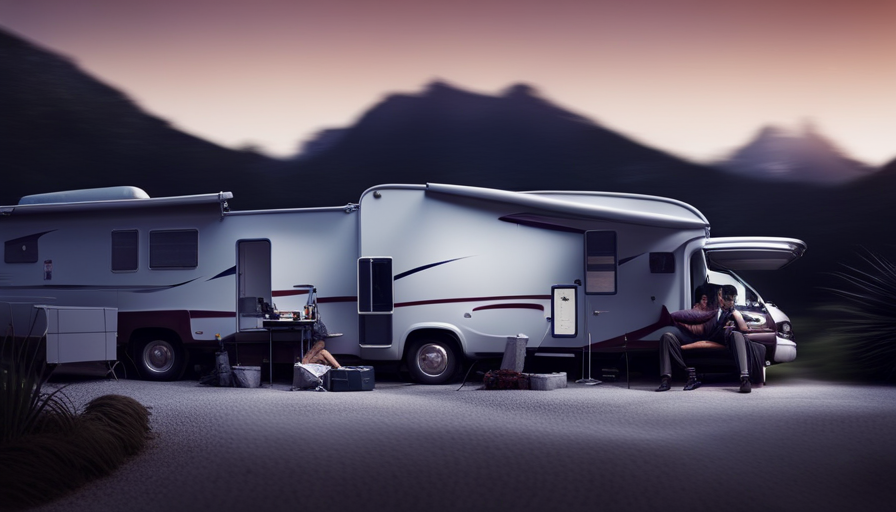Have you ever wondered about the weight of your camper?
I mean, it’s not like I’m trying to lift it with my bare hands or anything, but knowing its weight is actually pretty important. Trust me, it can make all the difference when it comes to your safety on the road and even your vehicle’s fuel efficiency.
Plus, you don’t want to exceed your vehicle’s towing capacity and risk damaging it or causing accidents.
So, let’s get down to the nitty-gritty of camper weight. In this article, I’ll guide you through the importance of knowing your camper’s weight, how it affects safety and fuel efficiency, and how to properly weigh your camper.
We’ll also discuss the significance of matching your camper’s weight to your vehicle’s towing capacity and how to load and distribute weight correctly.
So, if you’re ready to dive into this weighty matter, let’s get started!
Key Takeaways
- Knowing the weight of your camper is important for safety on the road and fuel efficiency.
- Exceeding weight limits can lead to problems such as trailer sway, tire blowouts, and structural failure.
- Heavier campers require longer stopping distances, highlighting the importance of camper weight on braking distance.
- Proper weight distribution in the camper reduces the risk of accidents and enhances safety.
Understanding the Importance of Knowing Your Camper’s Weight
Knowing your camper’s weight is crucial because it determines the type of vehicle you need to safely tow it, ensuring a smooth and worry-free travel experience. The importance of weight limits in camper design cannot be overstated.
Camper manufacturers carefully calculate these limits based on factors such as structural integrity, axle ratings, and suspension capabilities. Exceeding these limits can lead to serious problems, including trailer sway, tire blowouts, and even structural failure.
One key aspect affected by camper weight is braking distance. When you apply the brakes, the weight of the camper influences how quickly your towing vehicle can come to a complete stop. The heavier the camper, the longer the braking distance required. This means that if your camper is too heavy for your vehicle’s braking capacity, you may not be able to stop in time to avoid a collision.
Understanding your camper’s weight helps you choose a towing vehicle with adequate braking power, ensuring your safety and that of others on the road.
Ensuring safety on the road with proper weight distribution is the next crucial step.
Ensuring Safety on the Road with Proper Weight Distribution
To ensure your safety on the road, it’s crucial to maintain proper weight distribution in your camper. This significantly reduces the risk of accidents. Ensuring proper weight distribution involves understanding the importance of weight limits and taking necessary precautions.
Here are three key factors to consider:
-
Load distribution: Distribute the weight evenly throughout your camper to maintain stability. Avoid placing heavy items on one side, as it can lead to imbalanced weight distribution, making your camper more prone to swaying or tipping over.
-
Tongue weight: Pay attention to the tongue weight, which is the downward force exerted on the hitch ball by the camper’s coupler. It should typically be around 10-15% of the total trailer weight. An improper tongue weight can affect the handling of your camper, causing it to sway or fishtail.
-
Weight limits: Always adhere to the weight limits specified by your camper’s manufacturer. Exceeding these limits can damage the axles, suspension, and tires, compromising the overall safety and performance of your camper.
By ensuring proper weight distribution and adhering to weight limits, you can significantly enhance the safety of your camper and reduce the risk of accidents. Understanding the impact of camper weight on fuel efficiency is the next step in optimizing your travel experience.
Impact of Camper Weight on Fuel Efficiency
Maintaining a well-balanced weight distribution in your camper can have a significant impact on how efficiently it consumes fuel. When your camper is too heavy, it can affect its road handling and increase the risk of accidents. The weight distribution plays a crucial role in how your camper responds to steering inputs, especially during turns and sudden maneuvers. An overweight camper may become more difficult to control, leading to decreased stability and compromised road handling.
Additionally, the weight of your camper can influence the braking distance. A heavier camper requires more time and distance to come to a complete stop, increasing the risk of rear-end collisions. The added weight puts more strain on your vehicle’s brakes, potentially causing premature wear and reducing their effectiveness.
By carefully managing the weight of your camper, you can improve fuel efficiency and ensure safer travels. Matching your camper’s weight to your vehicle’s towing capacity is an essential step in achieving this balance. It’s crucial to consider both the weight of your camper and the weight limitations of your vehicle to avoid exceeding its towing capacity. This will help maintain optimal fuel efficiency and ensure a safer and more enjoyable journey.
Matching Your Camper’s Weight to Your Vehicle’s Towing Capacity
When you ensure that your camper’s weight is a perfect match for your vehicle’s towing capacity, you create a harmonious partnership that glides effortlessly down the road, like a synchronized dance between two trusted companions.
Matching your camper’s weight to your vehicle’s capabilities is crucial to maintaining a safe and efficient towing experience.
Exceeding your vehicle’s towing capacity can lead to potential risks and problems. It can put excessive strain on your vehicle’s engine, transmission, and braking system, leading to increased wear and tear. This can result in decreased fuel efficiency, decreased handling and control, and potentially even damage to your vehicle.
Additionally, exceeding your towing capacity can affect your vehicle’s warranty and insurance coverage, leaving you financially vulnerable in case of an accident.
To avoid these risks, it is important to thoroughly research and understand your vehicle’s towing capacity before selecting a camper. Consider the weight of the camper, including additional gear and supplies, to ensure it falls within your vehicle’s recommended limits.
This will help maintain the safety and performance of both your vehicle and your camper, allowing you to enjoy your adventures without worry.
Considering the Weight of Additional Gear and Supplies
Packing up your camper with extra gear and supplies adds an element of excitement and anticipation to your adventures on the road. However, it’s important to consider the weight of these additional items to ensure that you don’t exceed your vehicle’s towing capacity or put unnecessary strain on your camper’s suspension system.
Calculating weight distribution is a crucial step in packing essentials efficiently. Start by making a list of all the gear and supplies you plan to bring. Consider the weight of each item and distribute it evenly throughout your camper. This will help maintain stability and prevent any imbalance that could affect your vehicle’s handling.
When packing, be mindful of the weight of individual items. Opt for lightweight versions of camping equipment whenever possible, and avoid unnecessary duplicates. Additionally, make use of storage compartments and organizers to maximize space and distribute weight evenly.
As you pack, keep in mind that heavy items should be placed lower and closer to the center of the camper, while lighter items can be placed higher. This will help maintain a lower center of gravity, improving stability during travel.
By calculating weight distribution and packing essentials efficiently, you can ensure a safer and more enjoyable journey. Now that you have a good understanding of how to pack your camper, let’s move on to calculating the total weight of your camper and ensuring it falls within your vehicle’s towing capacity.
Calculating the Total Weight of Your Camper
To ensure a safe and enjoyable journey, make sure you calculate the total weight of your camper before hitting the road.
Calculating the weight of your camper is crucial for several reasons. Firstly, it helps you determine if your vehicle is capable of safely towing the camper. Exceeding the towing capacity can lead to accidents and damage to both your vehicle and the camper.
Secondly, knowing the weight of your camper allows you to distribute the weight properly to ensure stability and prevent swaying or fishtailing while driving. Improper weight distribution can make your vehicle difficult to control and increase the risk of accidents.
Additionally, understanding the weight of your camper is essential for determining the appropriate hitch and towing equipment needed. By calculating your camper’s weight and considering weight distribution, you can ensure a safer and more stable towing experience.
Learning how to weigh your camper will further assist you in properly preparing for your journey and ensuring a smooth and worry-free adventure.
Learning How to Weigh Your Camper
Calculating the total weight of your camper is crucial for a safe and enjoyable camping experience. Now that we know how to calculate the weight, let’s focus on the next important step: actually weighing your camper.
Weighing your camper is essential because it provides accurate information about its weight distribution and ensures that you’re not exceeding any weight limits.
To weigh your camper, you can use a variety of methods. One popular option is using a specialized camper scale, which is designed to handle the weight and size of campers. These scales are typically located at truck stops or RV service centers. Alternatively, you can also use a public weigh station or a commercial scale. Just make sure to check if they allow individual vehicle weighing before you go.
Knowing the weight of your camper is important for several reasons. Firstly, it helps you determine if your vehicle is capable of safely towing the camper. Secondly, it ensures that you’re not exceeding the weight limits imposed by your vehicle’s manufacturer or the road regulations. Lastly, it helps you distribute the weight properly inside the camper to avoid any stability issues on the road.
Now that we know how to weigh our campers accurately, let’s move on to the next step: choosing the right equipment for your camper’s weight.
Choosing the Right Equipment for Your Camper’s Weight
When it comes to towing a camper, it’s crucial to ensure you have the right equipment for its weight. This will make your journey safe and hassle-free. Here are some equipment recommendations and weight distribution tips to help you choose the right gear for your camper:
-
Weight distribution hitch: This device helps distribute the weight evenly between your camper and towing vehicle, improving stability and control while towing.
-
Sway control system: Installing a sway control system can reduce trailer sway caused by crosswinds or passing vehicles, making your journey safer and more comfortable.
-
Trailer brake controller: A brake controller is essential for trailers that weigh over 1,500 pounds. It helps synchronize the braking system of your camper with your towing vehicle, ensuring smooth and controlled stops.
-
Towing mirrors: These extended mirrors provide a wider field of vision, allowing you to see the entire length of your camper and any potential blind spots.
By using the right equipment, you can ensure that your camper is properly loaded and distributed, minimizing the risk of accidents and improving your overall towing experience.
In the next section, we’ll explore tips for properly loading and distributing weight in your camper.
Tips for Properly Loading and Distributing Weight in Your Camper
When it comes to camping, one of the most important factors to consider is the weight of your camper. In my previous subtopic, I discussed the importance of choosing the right equipment for your camper’s weight.
Now, let’s shift our focus to the proper loading and distribution of weight in your camper.
Proper weight distribution is crucial for a safe and comfortable camping experience. By distributing the weight evenly, you can ensure that your camper remains stable on the road and doesn’t put excessive strain on the tires or suspension. Additionally, proper weight distribution can help maximize the available space inside your camper, allowing you to pack all the essentials without overcrowding.
To achieve proper weight distribution, start by placing heavy items, such as camping gear or food supplies, in the lower and central areas of your camper. This will help lower the center of gravity and maintain balance. It’s also important to secure these items to prevent shifting during transit.
When loading your camper, be mindful of the weight limits specified by the manufacturer. Overloading can lead to safety hazards and damage to your camper. Take the time to weigh your camper and ensure you’re within the recommended limits.
In the next section, we’ll explore resources for finding accurate information about your camper’s weight. It’s essential to have this information to make informed decisions about loading and towing your camper.
Resources for Finding Camper Weight Information
To find accurate information about the weight of your camper, you can utilize various resources available to you. One option is to consult the manufacturer’s website or contact their customer service directly. They’ll have the most up-to-date and reliable information regarding the weight specifications of your specific camper model.
Another resource is the owner’s manual that came with your camper. It should include details about the weight limits and recommendations for loading and distributing weight.
If you’re unable to find the information through these sources, you can also consider weighing your camper at a certified weighing station. They’ll have the necessary equipment to accurately measure the weight of your camper. This can be particularly useful if you’ve made modifications or additions to your camper that may affect its weight.
It’s important to note that exceeding the weight limits of your camper can lead to safety issues and potential damage to your vehicle. It’s always best to adhere to the recommended weight limits and distribute the weight evenly to ensure a safe and enjoyable camping experience.
Finding accurate camper weight specifications and weight limits can be done through various resources such as the manufacturer’s website, the owner’s manual, or by weighing your camper at a certified weighing station. Adhering to these weight limits is crucial for the safety and longevity of your camper.
Frequently Asked Questions
Are there any legal weight restrictions for campers in my area?
Oh, legal weight restrictions for campers in my area? How exciting!
Well, let me inform you that yes, there are indeed legal weight restrictions for campers in many areas. These restrictions vary from place to place, so it’s important to check with your local authorities for specific guidelines.
Additionally, using a weight distribution hitch can help ensure that your camper is properly balanced and within the legal weight limits.
Stay informed and happy camping!
How does the weight of my camper affect the wear and tear on my vehicle?
The weight of a camper can have a significant impact on both fuel efficiency and vehicle stability. A heavier camper will require more power to tow, resulting in decreased fuel efficiency. Additionally, the added weight can affect the stability of the vehicle, especially during turns or in windy conditions.
It’s important to consider these factors when determining the optimal weight for your camper to minimize wear and tear on your vehicle.
Can I exceed my vehicle’s towing capacity if I have a weight distribution hitch?
Yes, it’s possible to exceed your vehicle’s towing capacity even if you have a weight distribution hitch. While weight distribution hitches help distribute the weight of the camper more evenly, they don’t increase the maximum towing capacity of your vehicle. Exceeding the towing capacity can put excessive strain on your vehicle’s engine, transmission, and brakes, leading to potential damage and safety risks. It’s important to always stay within your vehicle’s recommended towing capacity to ensure safe and efficient towing.
What are the consequences of towing a camper that exceeds my vehicle’s towing capacity?
Exceeding my vehicle’s towing capacity with a camper can have disastrous consequences. It’s like trying to lift a boulder with toothpicks! The strain on the engine and transmission can lead to overheating, breakdowns, and costly repairs.
Moreover, the weight of the camper significantly impacts fuel efficiency, causing me to burn through gas faster than Usain Bolt.
It’s essential to always stay within the towing capacity to ensure a safe and smooth journey.
Are there any weight limits for specific parts of the camper, such as the roof or storage compartments?
Weight limits for specific parts of a camper, such as the roof or storage compartments, are important to consider for safe towing. These weight limits ensure that the camper’s structure can handle the load without compromising stability and durability. Exceeding the weight limits can lead to structural damage and potential accidents.
It’s crucial to consult the manufacturer’s guidelines or the camper’s manual to determine the specific weight limits for each part of the camper’s structure.
What Factors Contribute to the Weight of a Pull Behind Camper?
When considering the pull behind camper weight, multiple factors come into play. The construction materials used, such as aluminum or fiberglass, greatly influence the overall weight. Additionally, the size and dimensions of the camper, including its length and height, contribute to its weight. The inclusion of amenities like appliances, furniture, and water tanks can also impact the pull behind camper weight significantly. Lastly, the type and number of axles, along with the capacity of the suspension system, play a crucial role in determining the weight it can handle while being towed.
Conclusion
In conclusion, knowing the weight of your camper is crucial for a safe and efficient journey. One interesting statistic to note is that according to a study by the RV Industry Association, the average weight of a travel trailer in the United States is around 5,200 pounds.
This highlights the importance of understanding your camper’s weight and ensuring it’s compatible with your vehicle’s towing capacity. By properly weighing and distributing the weight, you can enjoy a smooth and hassle-free camping experience. Remember to consult reliable resources for accurate camper weight information and follow the necessary guidelines for a successful trip.










